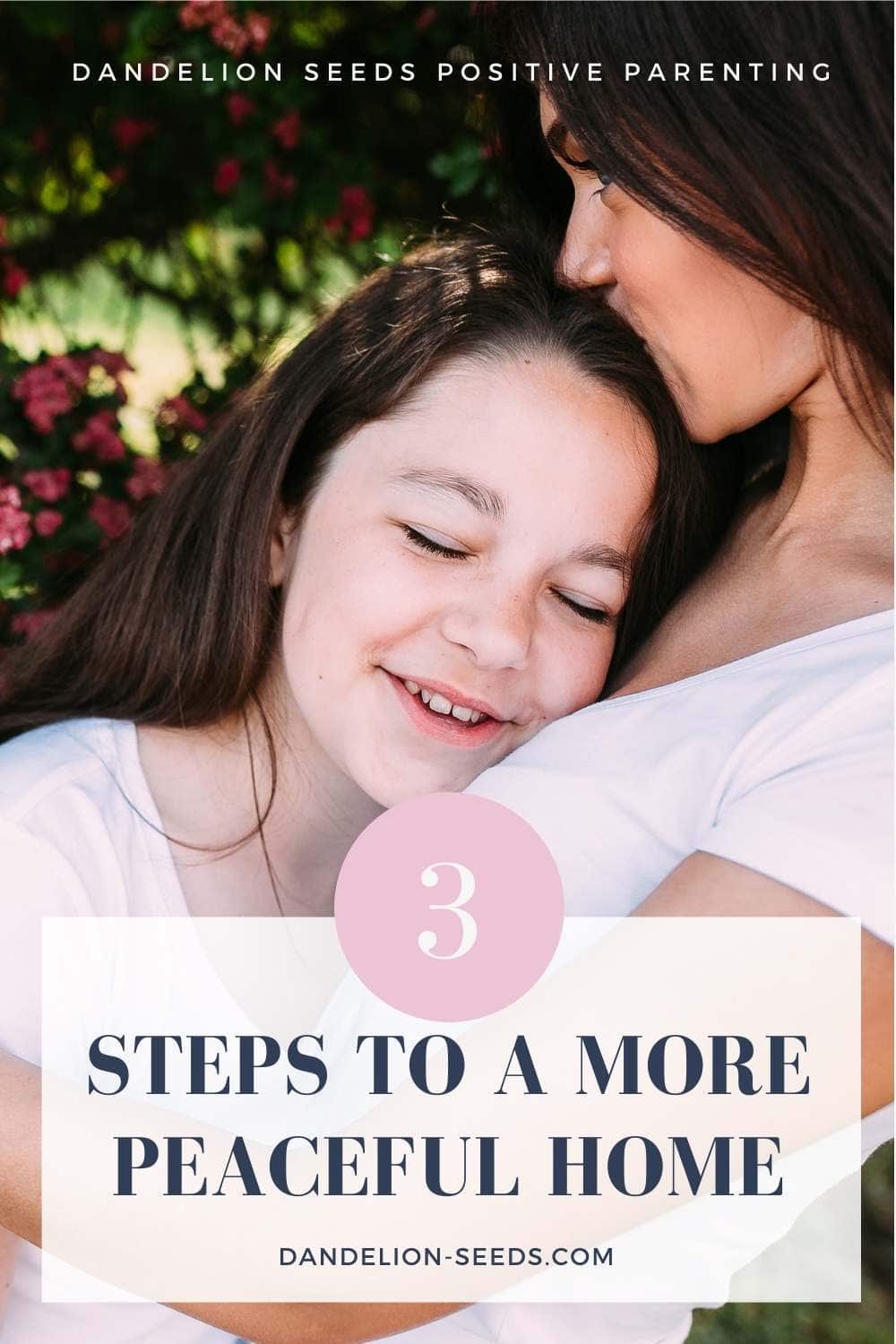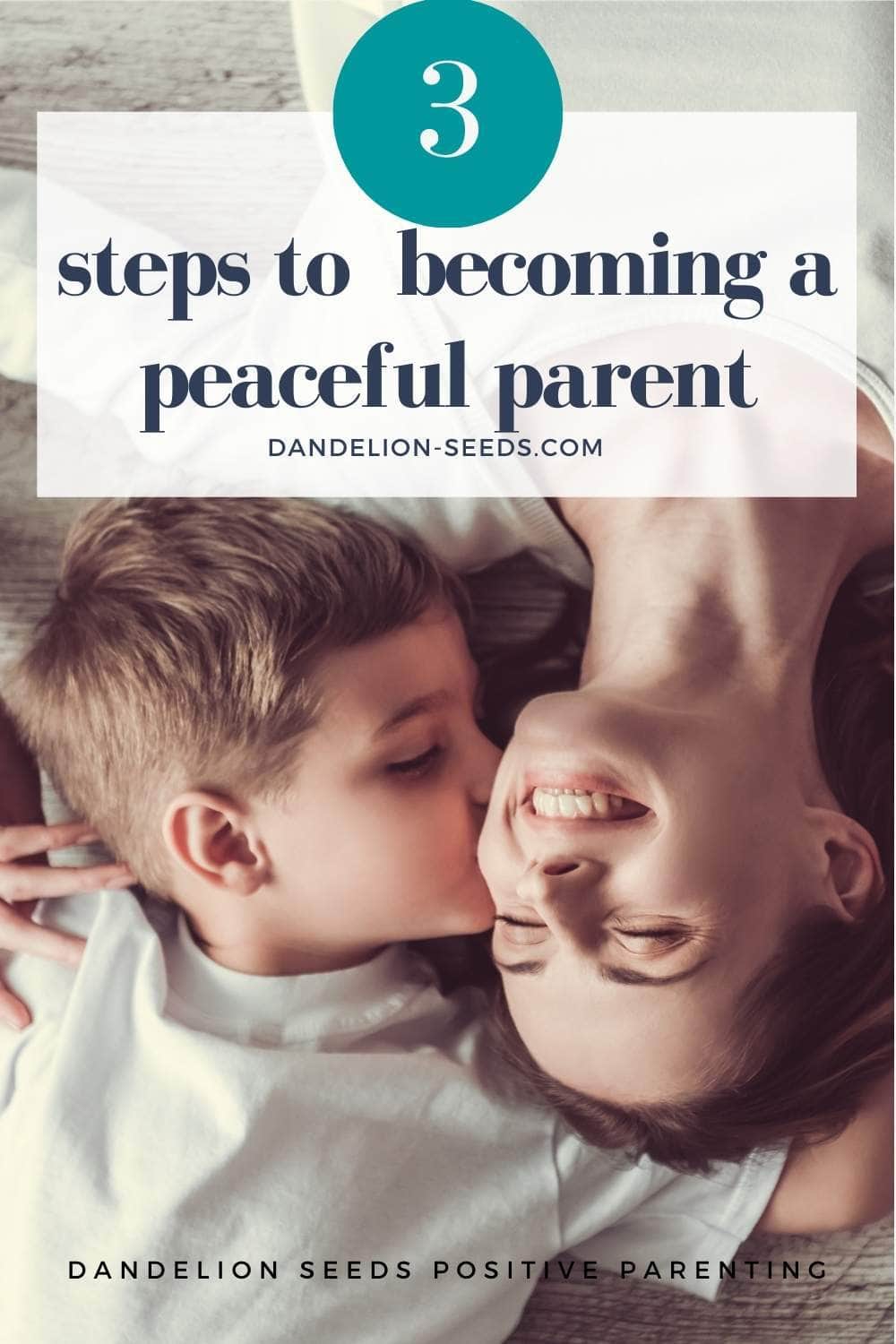
Sign in
Don't have an account with us? Sign up using the form below and get some free bonuses!

Peaceful parenting feels like it should come naturally to us. Reality, however, is that we're sometimes anything but peaceful with those we love most. Despite our best intentions, we snap at our children; we feel exasperation ooze forth from our parent-bodies.
Parenting can be much harder than "regular" adulting.
As I've said before, the culprit is that we're humans living with other humans. That is inherently tricky, no matter how much we love our children. Our moments of suboptimal parenting don't mean we're a "bad" parent overall. Science says we're often simply emotionally exhausted. (Here's what to do if we find ourselves feeling that way.)
The parent-child relationship doesn't need to be tricky all the time, however. We can parent in a way that changes everything for the better with our children. We can finally and truly live in a way that helps us release whatever guilt we've been harboring and feel better.
Peaceful parenting makes our days easier, not only for us, but also for our children.
I find many of the peaceful parenting concepts I've read about to be helpful. However, while they're great in theory, I've sometimes feel ill-equipped when I'm "in the moment" of parenting my child.
Resultantly, I devised the "HUG" process -- a quick acronym to help me remember exactly what to do when tensions rise with the children in my life -- the ones I've taught and the one I'm raising at home.
Peaceful parenting benefits not only our children, but us, too. It offers us all a more peaceful home life. I like peace. That's my motivation.
Let’s pull each of those apart with an example of what peaceful parenting looks like in action.

Let’s say your 5-year-old child just poured all the dog food from the bowl onto the floor, seemingly intentionally. She’s no longer a toddler (where this would be developmentally normal behavior). She regards you with the “look” that tells you, “I know you saw me do this -- and I did it anyway.”
When things like this happen, we sometimes wonder if we should just throw in the towel right here. It can feel like our kids are out to “get” us . And let’s face it, sometimes it feels like they’re winning.
When we’re not consciously focused on peaceful parenting, our reaction might be to yell, accuse, shame, punish, or somehow use our internal angst to “deal with it” right in that moment. We, ourselves, go into fight-or-flight mode when we react from a big emotional response.
We must remember that it's not parents versus children; it's parents and children versus whatever problems they're trying to solve. No one's "winning" -- we're working together. We're on the same team.
Just like with all emotionally heated situations, however, reacting on the fly doesn’t usually work for the greater good. We are not likely to be calm and emotionally grounded in these moments.
We know we want to embody peaceful parenting – but we need tools to help us.
Here’s what parenting this way looks like in action.
How do you do that?
Many of us have read about ways to help our children calm down when they’re upset. Many of those approaches work well for us, too. I talk about several of them in this short but information-packed course. A few quick ones for parents to remember are these:
If you're worried that your 5-year-old child isn't learning from an immediate consequence of their actions, remember that the most important message they might learn here is emotional regulation.
They're watching how you use your calming tools. With experience, they'll grow to model them.
Part of parents' ability to do this, of course, is having the emotional reserves to manage these situations when they come up. Self-care “feeds” us those reserves. Self-care isn't optional; your kids need you to do it.
While you’re holding your reaction (or as some say, "practicing the pause," and after you feel your heart rate return to normal, move onto the “U” of the HUG process.

Ask yourself this: “From their perspective, what might have driven their behavior?”
If you find yourself mentally launching into accusations, return to the H. Hold on. Dig deeper.
Put yourself in your child’s shoes. Did something happen that made them feel disconnected? Were they seeking attention, which you can reframe as seeking attachment? (Here’s how to handle that.) What’s going on in their world that might’ve been the impetus for their action? They might not have the words to articulate what it was, but it's always somewhere beneath the surface.
As unlikely as it may feel in the moment, children want to do well for us. Try to give them the same benefit of the doubt you'd want if you'd somehow behaved sub-optimally. You'd want others to understand what motivated you to do it, deep down inside. This is hard but important work.
Once you've worked to understand your children's perspective, the natural human response is compassion. It doesn't necessarily mean you agree with them; it means you value their humanity.
Look at the big picture from the framework of peaceful parenting: have they experienced changes in their life that are causing stress in ways you might not have realized were related? Are they feeling connected to you, their siblings, and their classmates? Are they working to learn a new skill that's feeling hard for them? Are they grieving or re-living an old wound?
You can empathize with whatever they've been processing, and start thinking more objectively about what's motivated their behavior. Once you've let yourself drift into empathy mode, move onto the “G” of the peaceful parenting HUG process.
Oftentimes, if we can find the presence of mind to see their perspective, peaceful parenting will come about naturally from the compassion we've allowed to rise up in our bodies.
“I wonder…” statements work well here. So do, “I’m curious about…” Invite your child to share their heart with you about what happened. If your child isn’t volunteering an explanation (which is very, very common), it’s okay if you offer a theory. It might sound something like this:
“I wonder if you were feeling angry that I was on the phone for a long time. Are you craving some special time together?”
In peaceful parenting, listen without defending; truly listen. What is their heart trying to tell you? Regardless what they say, the message you want to drive home in this moment is, “You’re safe to share your feelings with me.”
Take whatever they offer as feedback as part of the bigger picture. This can be your guidepost to figure out what they’re needing. Odds are good that once that underlying need is met, they won't feel the need to pour out the dog food again. Remember Dr. Ross Greene's sage reminder: "Kids do well when they can."
I’m never going to advocate punishment. That show isn’t on this channel.
In lieu of punishment, try a time-in. Here, your child has the opportunity to co-regulate with you. As I discussed with Tina Payne Bryson, Ph.D., co-regulation is a powerful tool for growing healthy brains.
If they've already moved past the incident, don't worry that you've "missed your chance" to instill ways to do better. Discipline -- teaching -- can still happen with your child. Consequences simply take a different form with peaceful parenting: it's a gentle allowance for the full expression of feelings. It's parenting for connection one moment, one love- and grace-based decision, at a time.
I don't necessarily expect us to clean up after our kids, at least not every time.
Sometimes, though, I think it’s perfectly fine to clean up after them (or at least alongside them). Healthy, in fact. In doing so, we model graciousness. We model that it's okay to help each other out when we're having a rough time. It's an act of service, which is a love language unto itself.
Alternatively, if the child is emotionally centered again, I might lightheartedly say, “Now that we’ve had a good chat, how about I hold the dog’s bowl and you see how many pieces you can drop into it from 6 inches above it?” Or, “Would you rather hold the broom or the dustpan?” Collaborative, playful parenting can help diffuse the tension and get rid of the question of “Whose responsibility is it?”
If anyone wonders, "But wait -- the child intentionally threw the food on the floor. Don't I need to teach them a lesson somehow? How will they learn?" My answer is this: yes, you do need to teach them a lesson. Not in the traditional disciplinarian way, however.
Debrief with them. Once they're calm (and you're calm, too), summarize in a single sentence or two why they shouldn't have done what they did. Here's the important part -- now, brainstorm together about better ways to handle the situation in the future.
Example: "The dog's food needs to stay in the bowl so no one slips on it. It's a safety hazard on the floor." [Healthy boundary setting.] "Now that I know you were wanting some snuggle time while I was on my phone, however, let's think about some ways you could let me know next time."
If your child was feeling disconnected, for example, perhaps you invite them to hand you a special piece of paper that says what they need. Some children aren't comfortable verbalizing their needs, but with coaching, a non-verbal way to communicate their needs works well. If they're too young to write, they might draw a picture of what they want to say (or hold up a pre-selected picture of it).
We’re all going to mess up sometimes – and that’s okay (rupture and repair is a fascinating process). We don't always feel peaceful. What matters is that we’re trying. The very fact that peaceful parenting is now in our consciousness gives us an edge over a life where it's not even on our parenting radar.
Our kids will see our peaceful parenting efforts. We’ll connect more deeply, knowing our connection is solid. If we rupture that connection sometimes, repair comes more easily.
Children aren't out to “get us” parents. They are, however, out to connect with us – deeply and in meaningful ways. Peaceful parenting is a wonderful part of the parent-child dynamic, fostering the very connection that every single one of us craves.